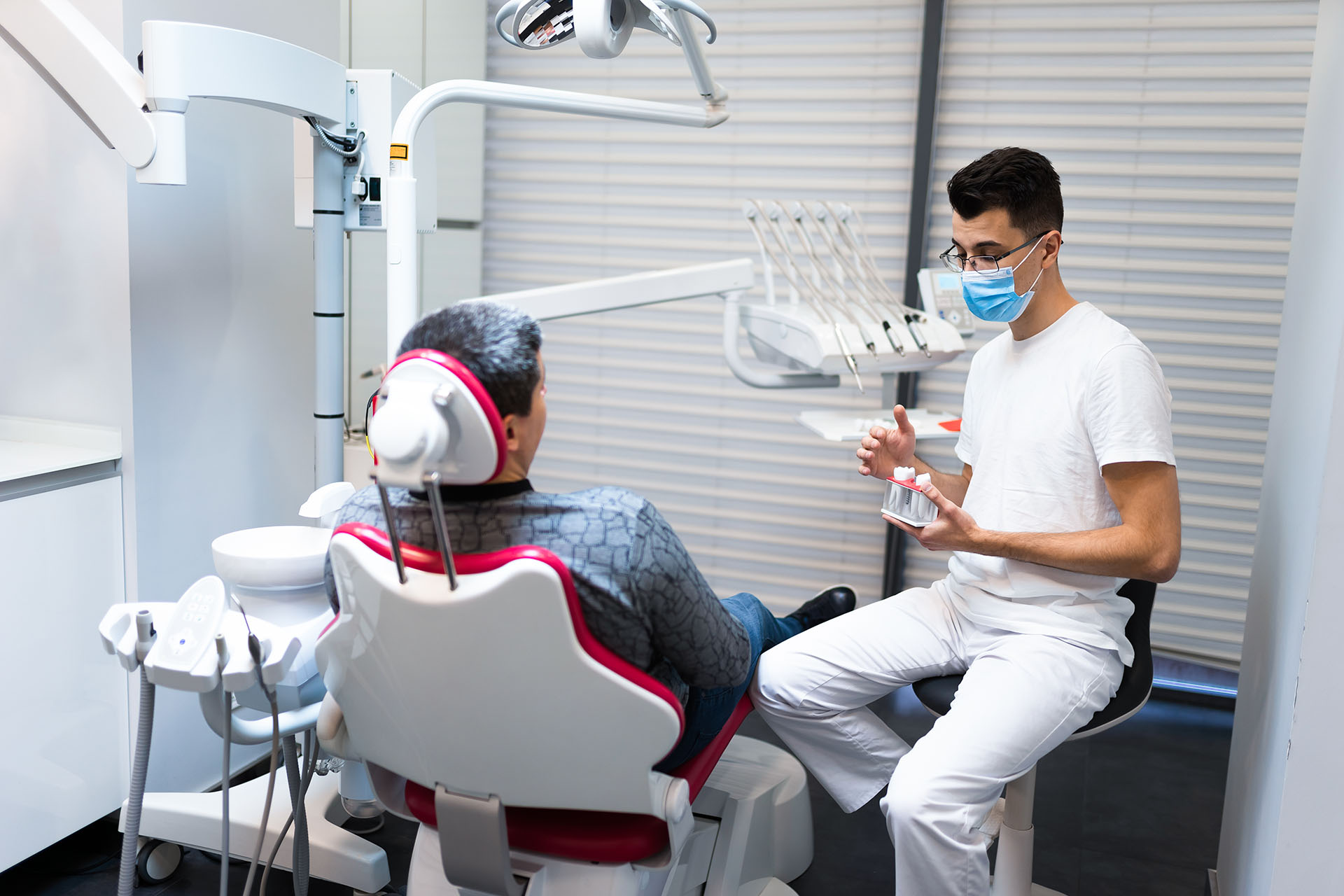If you’ve lost or damaged any of your adult teeth, dental implants are an effective way to fill in the gap and reclaim your smile. These artificial tooth roots are surgically inserted into your jawbone, and topped with a natural-looking crown, resulting in a strong, stable replacement tooth. With a high success rate (95%), dental implants are stronger than removable teeth, more comfortable, and often work better than dentures or bridgework. But, bad dental implants – those that become infected, are poorly positioned, or loose – can carry risk, may result in post-surgical complications, or long-term problems. To help relieve the anxiety our patients may feel, we’ve outlined a brief look into how dental implants work, and will discuss the top risks, complications, and long-term problems below, and how we make sure these issues never occur for our patients.
Dental Implants: A Brief Look At The Surgical Steps Involved
The process of getting dental implants involves several steps that can take a few months to complete.
1. Jaw Prep: If you have a heavily damaged tooth, it will be extracted, and you’ll need to take time to heal. You may need a bone graft to stimulate bone growth or to increase bone density to ensure that your jaw can handle a dental implant. To find this out, dental x-rays are taken to assess your jaw bone health during a consultation with one of our surgeons.
2. Implant Insertion & Abutment Positioning: If your jaw can handle a dental implant, the next step is to surgically insert the biocompatible metal implant into the jawbone, along with a titanium metal post. This is done under local anesthesia or IV sedation, can take a few hours, and requires a significant amount of skill on the part of our surgeon. 3-6 months are required for your jawbone to heal and fuse with the implant, ensuring a strong bond.
a. Depending on your personal situation, the metal base of the implant and the titanium metal post may be inserted separately across two surgical visits.
3. Your Artificial Tooth: The final step is to attach the permanent restoration. This can be a single custom-crown, a fixed bridge, or an implant-supported denture depending on whether we’re replacing one tooth or many. Impressions of your mouth are taken, and sent off to our laboratory to ensure that your artificial tooth matches the size, shape, and color of your natural teeth. This restoration is affixed to the implant post with dental cement, and minor adjustments are made to ensure a comfortable fit and bite alignment.
7 of the Top Risks & Complications Associated With Bad Dental Implants
While dental implants have a high success rate, there are still risks and complications associated with bad dental implants post-surgery.
1. Osseointegration Failure. When dental implants fail to integrate successfully with the bone, it’s called osseointegration failure, which simply means that your jawbone hasn’t grown around the implant and secured it in place. As a result of this, the bad dental implant will be too loose, won’t function correctly, and may even fall out. This can occur if the implant is placed incorrectly, or if there is insufficient bone mass to support the implant. In the event of this happening, the dental implant must be removed.
2. Improper Implant Placement. Bad dental implants can occur due to the improper placement of an implant’s metal base or titanium post. If an inexperienced surgeon places your implant too shallow, it may not be strong enough to support the restoration, which can then put additional strain on adjacent teeth. Another potential complication of this is if the implant is positioned too close to nerves, resulting in nerve damage and persistent numbness, pain, and tingling/burning sensations (this is a long-term complication).
3. Infection. A common complication of dental implant surgery is an infection at the implant site. An infection can develop during surgery if bacteria enters the surgical site or after, if the implant region isn’t cleaned regularly. Symptoms of an infection after implant surgery include pain, swelling, fever, and delayed healing. There are two types of infection that can happen here; (a) that of the gum tissue which requires antibiotics, (b) that of the bone tissue, which requires the removal of the implant and a bone/tissue graft.
4. Sinus Issues. If a dental implant that is being inserted into the upper jaw, protrudes into the sinus cavity, this can cause a whole host of problems. Not only will it cause inflammation, but one may experience pain/swelling/tenderness around the cheeks/eyes/forehead, and you may find yourself with a blocked nose, headaches, toothaches, a reduced sense of smell, green/yellow nasal mucus, bad breath, and a high temperature.
5. Gum Recession. With improper cleaning or an ill-fitting dental restoration, this can lead to gum recession around the dental implant. Eventually, this can lead to inflammation and pain, and puts you at risk for bacterial infection, as the tissue recedes and creates gaps between itself and the implant.
6. Implant Cracking From Excessive Force. While a dental implant is artificial, it works in the exact same way as your natural teeth, and as such, is susceptible to excessive force being placed on it. Individuals that grind their teeth due to stress or nighttime bruxism, are more prone to cracking their implant, or causing it to become loose.
7. Peri-Implantitis. You can have a bad dental implant develop if there is chronic inflammation at the implant’s insertion site. The most common cause of this, beyond those listed above, is peri-implantitis, a slow-progression inflammatory condition that causes bone loss in the jawbone region that supports the implant. It can take upwards of 5-years for this type of gum disease to progress to the point of causing symptoms – bleeding and swelling.
It is also possible for the body to reject the dental implant, but this is quite rare and often occurs in patients who have metal sensitivities.
Our Zero-Complication Outcomes: Guaranteeing Implant Perfection with Expertise, Technology, and Patient Care
Here at Spring Haven Dental, we strive to provide the utmost quality care for our patients. That’s why our team of knowledgeable, highly-trained, and board-certified dentists are dedicated to achieving implant perfection – every time. We make the risk of bad dental implant complications impossible through a combination of our expertise, use of advanced technology, and steadfast attention to patient care.
Expertise
Achieving a successful dental implant requires intricate surgical expertise, and proficiency, particularly during the implant insertion and abutment placement stages. To ensure that we get it right every single time, we stay up-to-date on all the latest advancements in dentistry techniques by attending regular training and seminars, and combine this knowledge with our extensive experience to ensure that we handle all potential issues before we even consider moving forward with an implant.
Advanced Tech
We invest in modern technology like digital x-rays, intraoral cameras, and Cone Beam CT scans. This equipment allows us to get an accurate picture of your mouth, identify any problem areas that may contribute to dental implant complications, and gives us the information we need to design a personalized plan so that you get the best outcome for your specific situation. For every patient needing implants, we use a Cone Beam CT scan to get a full and clear view of your jawbone, allowing us to verify its health and density, to ensure that it will support and hold a dental implant. This scan also allows us to pinpoint the exact size and shape of the dental implant that would best fit your mouth. With this kind of tech, we avoid osseointegration failure, improper placement, and sinus cavity protrusion.
Patient Care
Proper patient care is essential to a successful implant restoration. To avoid bad dental implants, we take the time to get a complete medical history, as this helps us rule out potential metal sensitivities, and determines if we need to provide you with a dental mouth guard due to bruxism. Our team provides detailed instructions on how to clean your implant post-surgery, and schedules you in for regular check-ups to avoid complications like infection, peri-implantitis, and gum recession. With Spring Haven Dental’s commitment to patient care, we make sure that each implant restoration is done with excellence from start to finish.
At Spring Haven Dental, our commitment to ongoing training, making use of advanced technology, and being a patient-focused dental practice, makes it near impossible for bad dental implants to develop in our patients. Let us help you get your implant restoration process started today. Contact us at (813)-448-6885 to book your consultation appointment.






